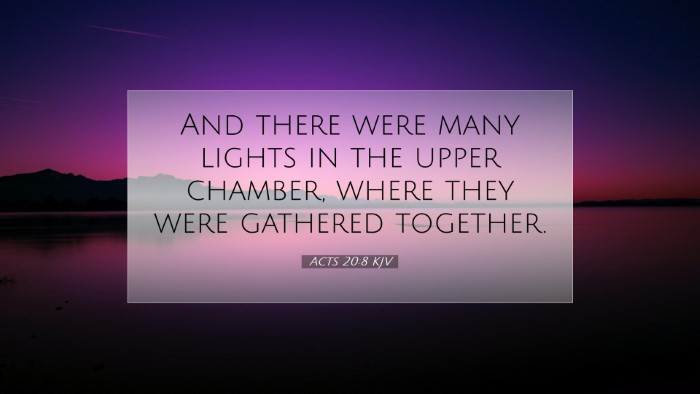Commentary on Acts 20:8
Acts 20:8 states: "There were many lamps in the upper room where we were gathered together." This verse captures an essential moment in the early Christian community, highlighting the significance of fellowship among believers. The commentary from various public domain sources provides a deeper understanding of this text.
Contextual Setup
To appreciate the nuances of this verse, it is important to recognize the context. This verse is part of a passage where the Apostle Paul is addressing the elders of the church in Ephesus. The events taking place illustrate the dedication of the early church and its leaders, reflecting on the communal aspect of their gatherings.
Observations from Matthew Henry
According to Matthew Henry's commentary, the assembly in the upper room represents a place of spiritual significance. Henry emphasizes:
-
The Symbolism of the Upper Room:
The upper room symbolizes a space of elevation, not merely in physical terms but spiritually, indicating a higher calling of the believers in a time of prayer and teaching.
-
Community and Fellowship:
Henry highlights that gatherings such as these were essential for strengthening the faith among the believers. The numerous lamps in the room represent not only physical illumination but also the spiritual enlightenment that comes from such gatherings.
-
Preparation for Teaching:
The setting implies seriousness in the teaching of God's Word, reflecting the atmosphere of reverence and commitment toward spiritual matters.
Insights from Albert Barnes
Albert Barnes provides a practical application of the scene:
-
Many Lamps, Many Hearts:
Barnes notes that the presence of many lamps signifies the unity of spirit among those attending. Just as they gathered with physical lamps, so too they were unified by the light of the Gospel.
-
Significance of Gathering:
He points out the importance of meeting together, noting that the early church emphasized the need for mutual encouragement and sharing of faith, an aspect vital to growing within the Christian community.
-
Environment of Worship:
The atmosphere in which they gathered is portrayed as conducive to soulful communication with God, wherein believers could share and rejuvenate their faith among each other.
Reflections from Adam Clarke
Adam Clarke’s exposition on this passage emphasizes key elements relevant for pastoral application:
-
The Role of Light:
Clarke elaborates on the lamps, suggesting that light is synonymous with knowledge and revelation. The many lamps illustrate a community richly endowed with understanding and the presence of the Holy Spirit.
-
Gatherings of Importance:
He asserts that such gatherings are fundamental, urging that Christians should be prompted to develop similar environments where individuals can come together in faith and be filled with spiritual fervor.
-
Practical Applications for Believers:
Clarke makes a persuasive argument for the practice of regular fellowship, stressing that believers should not forsake assembling together, as this is critical for spiritual growth and community cohesion.
Theological Reflections
This passage serves as a reminder that early Christianity was characterized by community and shared worship. This is a profound observation for modern-day Christianity, where individualism often prevails over communal obedience. The gathering signifies more than mere physical presence; it encapsulates the essence of what it means to be part of the body of Christ.
Lessons for Modern Believers
- Importance of Fellowship: Just as the early church gathered, contemporary believers are encouraged to create an environment where faith can be shared and nurtured.
- Illumination through Community: The lights in the upper room serve as a metaphor for the illumination found in shared experiences of worship and teaching.
- Commitment to Instruction: Like the early disciples gathering to hear Paul, modern Christians should prioritize sound teaching and passionate discourse on Scripture.
Conclusion
Acts 20:8 provides more than historical context; it encapsulates the communal desire for spiritual growth and understanding that the early church exemplified. Through insights provided by Matthew Henry, Albert Barnes, and Adam Clarke, a clearer picture emerges of the vital role community plays in the life of believers. As such, pastors, students, theologians, and Bible scholars are called to reflect on the importance of gathering together in faith, illuminating one another in the message of Christ.


